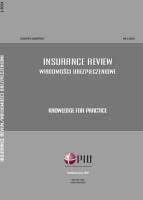The concept of rationalising damage and the scope of insurer’s liability
The concept of rationalising damage and the scope of insurer’s liability
Author(s): Aneta PalecznaSubject(s): Law, Constitution, Jurisprudence
Published by: Polska Izba Ubezpieczeń
Keywords: indirect violation of rights and interests; monetary compensation; harm; insurance
Summary/Abstract: The concept of indirect violation of rights and interests holds an important place in the system of liabil- ity for damages. Therefore, the analysis of that subject matter should focus not on whether the damage is compensable but on the basis and extent of compensation. The diversity of events that may give rise to an “indirect damage” does not make it easy to identify its prerequisites. On top of that, the actions taken do not go in pair with harmonisation of terminology and do not lead to the introduction of one consistent liability model. An answer to the doubts arising in context of compensating for “indirect damage” is the concept of rationalising damage. It covers a set of directives that serve to determine if a given detriment qualifies as “indirect damage” and if a given person is an indirect victim. Not all violations are compensable, but only violations to legally protected interests. As a result, compensa- tion does not cover all inconveniences, or inconveniences forming a part of risk associated with eve- ryday life. Determination of the scope of compensating for indirect damage has a significant impact on the scope of liability of the insurer. This is the case as the model of compensation for indirect viola- tions should be “economically efficient.
Journal: Wiadomości Ubezpieczeniowe
- Issue Year: 2024
- Issue No: 1
- Page Range: 33-46
- Page Count: 14
- Language: English

